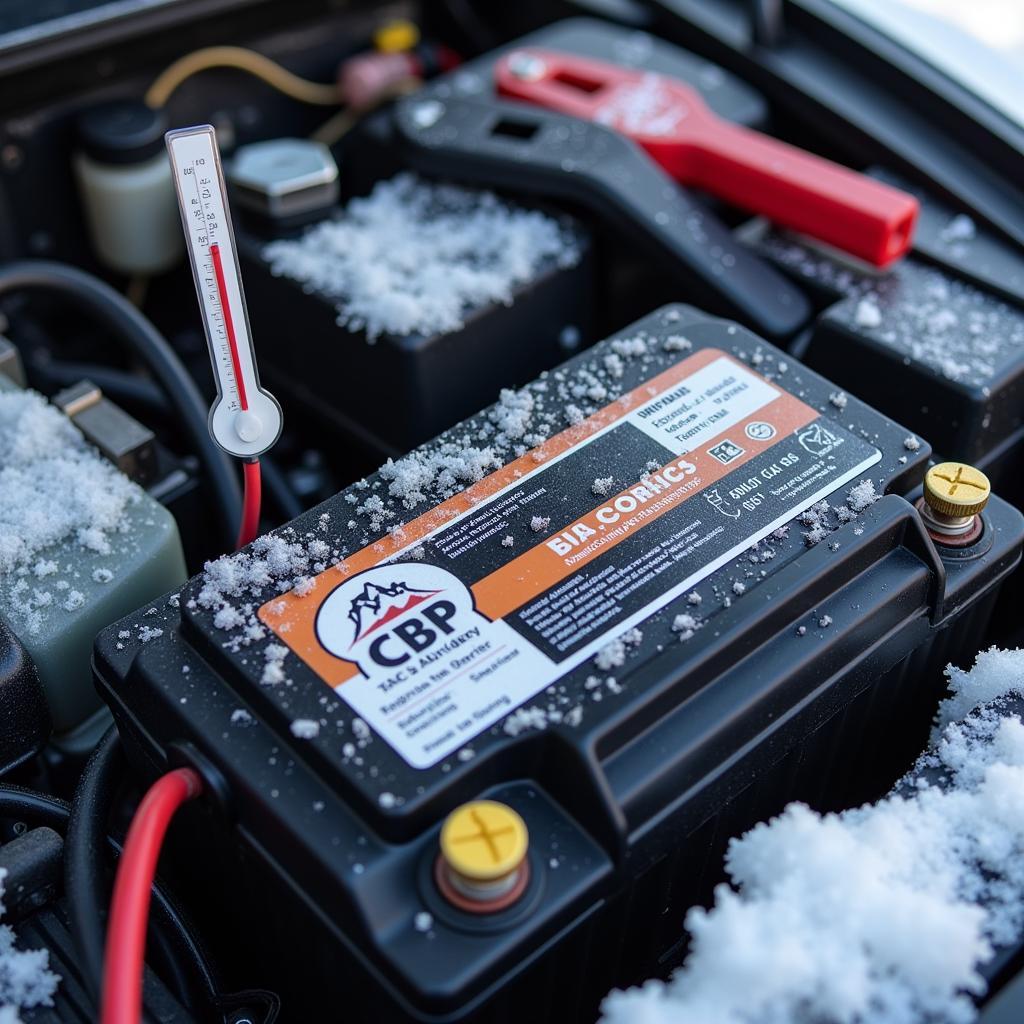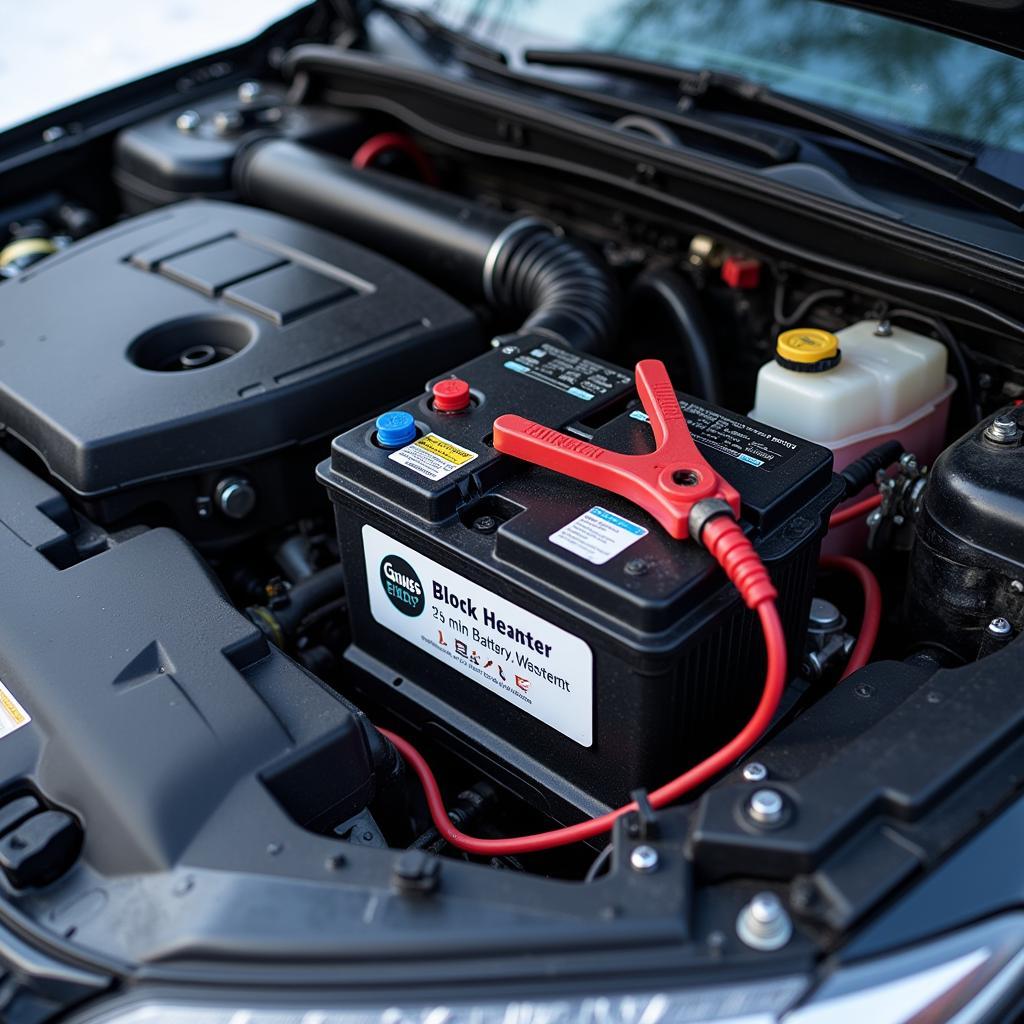Experiencing a car that won’t start in cold weather, even with a new battery? You’re not alone. This frustrating issue is surprisingly common, and there are several reasons why your seemingly healthy battery might be failing you when the temperature drops. Let’s delve into the common culprits and explore how to get your car running smoothly again. car battery draining fast
Why a New Battery Might Fail in Cold Weather
Cold weather can significantly impact your car’s battery performance, even if it’s brand new. Low temperatures reduce the chemical reactions within the battery, decreasing its cranking power. This means the battery struggles to deliver the necessary power to start your engine. Furthermore, engine oil thickens in the cold, making it harder for the engine to turn over, placing an even greater demand on the battery.
Understanding Cold Cranking Amps (CCA)
One crucial factor to consider is the battery’s CCA rating. CCA measures the battery’s ability to start an engine at 0°F (-17.8°C). A higher CCA rating indicates a better ability to perform in cold weather. Check your owner’s manual for the recommended CCA for your vehicle. If your new battery doesn’t meet these requirements, it might be struggling to start your car in frigid temperatures.
 Car Battery CCA in Cold Weather
Car Battery CCA in Cold Weather
Other Potential Issues
While a weak battery is a common culprit, other factors can contribute to cold weather starting problems. These include:
- Thickened Engine Oil: As mentioned earlier, cold temperatures thicken the engine oil, making it more difficult for the engine to turn over.
- Faulty Starter: A failing starter motor may struggle to turn the engine over, especially in cold weather.
- Corrosion: Corrosion on battery terminals can disrupt the electrical connection and prevent the battery from delivering power to the starter.
- Parasitic Drain: An electrical component in your car could be drawing power even when the car is off, slowly draining the battery overnight, leaving it too weak to start in the morning. dead battery from cold
Troubleshooting Your Car Starting Issues
Here’s a step-by-step guide to help you pinpoint the problem:
- Check the Battery Terminals: Inspect the battery terminals for corrosion. If you see any buildup, clean them with a wire brush and baking soda solution.
- Test the Battery: Use a multimeter to test the battery voltage. A fully charged battery should read around 12.6 volts.
- Check the Starter: If you suspect a faulty starter, listen for a clicking sound when you turn the key. This could indicate a starter problem. did my car battery die
- Inspect the Alternator: A failing alternator can prevent the battery from charging properly. Have it tested to ensure it’s functioning correctly.
“Many car owners overlook the importance of a battery’s CCA rating,” says John Smith, Senior Automotive Technician at Smith Auto Repair. “In cold climates, a battery with a higher CCA rating is crucial for reliable starting.”
Preventing Cold Weather Starting Problems
- Use a Battery Tender: A battery tender helps maintain the battery’s charge during periods of inactivity, especially during winter. start a car battery dead
- Park in a Garage: If possible, parking your car in a garage can protect the battery from extreme temperatures.
- Block Heater: Consider using a block heater to warm the engine oil, making it easier to start in cold weather.
“Using a battery tender is a simple yet effective way to prevent cold weather starting problems,” advises Jane Doe, Lead Mechanic at Doe’s Auto Services. “It’s like giving your battery a warm blanket on a cold night.”
 Car Battery Winter Maintenance
Car Battery Winter Maintenance
Conclusion
A car not starting in cold weather, even with a new battery, can be a frustrating experience. However, by understanding the factors that contribute to this issue and following the troubleshooting steps outlined above, you can identify the problem and get your car back on the road. Remember to check your battery’s CCA rating, maintain its charge, and address any potential issues promptly to avoid future cold-weather starting problems. 2014 gmc terrain battery problems
FAQ
- Why is my car battery draining fast in cold weather? Cold weather reduces battery capacity and thickens engine oil, making it harder to start and putting extra strain on the battery.
- How do I know if my car battery is bad in cold weather? If your car struggles to start or won’t start at all in cold weather, especially after sitting overnight, it could indicate a bad battery.
- What is the best battery for cold weather? Look for a battery with a high Cold Cranking Amps (CCA) rating, which indicates its ability to start an engine in freezing temperatures.
- Can extreme cold kill a car battery? While extreme cold can significantly reduce a battery’s capacity and lifespan, it doesn’t necessarily kill it instantly.
- Should I disconnect my car battery in cold weather? Disconnecting the battery can prevent parasitic drain, but it can also reset some electronic systems in your car. A battery tender is a better solution.
- How can I prevent my car battery from dying in cold weather? Use a battery tender, park in a garage if possible, use a block heater, and ensure your battery has a sufficient CCA rating.
- How often should I replace my car battery? Car batteries typically last 3-5 years, but extreme temperatures can shorten their lifespan.

